This article does not cite any sources .(July 2016) (Learn how and when to remove this template message) |
| Live Catch | ||||
|---|---|---|---|---|
 | ||||
| Live album by | ||||
| Released | 2004 | |||
| Genre | Blues | |||
| Taj Mahal chronology | ||||
| ||||
This article does not cite any sources .(July 2016) (Learn how and when to remove this template message) |
| Live Catch | ||||
|---|---|---|---|---|
 | ||||
| Live album by | ||||
| Released | 2004 | |||
| Genre | Blues | |||
| Taj Mahal chronology | ||||
| ||||

Lemon Henry "Blind Lemon" Jefferson was an American blues and gospel singer-songwriter and musician. He was one of the most popular blues singers of the 1920s and has been called the "Father of the Texas Blues".

Robert Leroy Johnson was an American blues guitarist, singer, and songwriter. His landmark recordings in 1936 and 1937 display a combination of singing, guitar skills, and songwriting talent that has influenced later generations of musicians. He is now recognized as a master of the blues, particularly the Delta blues style.

McKinley Morganfield, known professionally as Muddy Waters, was an American blues singer-songwriter and musician who was an important figure in the post-war blues scene, and is often cited as the "father of modern Chicago blues". His style of playing has been described as "raining down Delta beatitude".

Riley B. King, known professionally as B.B. King, was an American singer-songwriter, guitarist, and record producer. He introduced a sophisticated style of soloing based on fluid string bending, shimmering vibrato and staccato picking that influenced many later blues electric guitar players. AllMusic recognized King as "the single most important electric guitarist of the last half of the 20th century".

Jamesetta Hawkins, known professionally as Etta James, was an American singer who performed in various genres, including blues, R&B, soul, rock and roll, jazz and gospel. Starting her career in 1954, she gained fame with hits such as "The Wallflower", "At Last", "Tell Mama", "Something's Got a Hold on Me", and "I'd Rather Go Blind". She faced a number of personal problems, including heroin addiction, severe physical abuse, and incarceration, before making a musical comeback in the late 1980s with the album Seven Year Itch.

Elmore James was an American blues guitarist, singer, songwriter and bandleader. He was known as "King of the Slide Guitar" and was noted for his use of loud amplification and his stirring voice. For his contributions to music, James was inducted into the Rock and Roll Hall of Fame in 1992.

Tony Russell "Charles" Brown was an American blues singer and pianist whose soft-toned, slow-paced blues-club style influenced blues performance in the 1940s and 1950s. Between 1949 and 1952, Brown had seven Top 10 hits in the U.S. Billboard R&B chart. His best-selling recordings included "Driftin' Blues" and "Merry Christmas Baby".

Spencer Williams was an American jazz and popular music composer, pianist, and singer. He is best known for his hit songs "Basin Street Blues", "I Ain't Got Nobody", "Royal Garden Blues", "I've Found a New Baby", "Everybody Loves My Baby", "Tishomingo Blues", and many others.
Alex or Aleck Miller, known later in his career as Sonny Boy Williamson, was an American blues harmonica player, singer and songwriter. He was an early and influential blues harp stylist who recorded successfully in the 1950s and 1960s. Miller used various names, including Rice Miller and Little Boy Blue, before calling himself Sonny Boy Williamson, which was also the name of a popular Chicago blues singer and harmonica player. To distinguish the two, Miller has been referred to as Sonny Boy Williamson II.
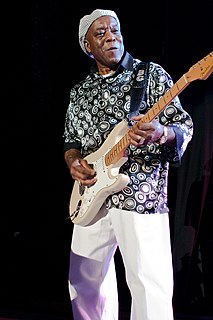
George "Buddy" Guy is an American blues guitarist and singer. He is an exponent of Chicago blues and has influenced guitarists including Eric Clapton, Jimi Hendrix, Jimmy Page, Keith Richards, Stevie Ray Vaughan, Jeff Beck, Gary Clark Jr. and John Mayer. In the 1960s, Guy played with Muddy Waters as a house guitarist at Chess Records and began a musical partnership with the harmonica player Junior Wells.

Norman Jeffrey Healey was a Canadian jazz and blues-rock vocalist, guitarist, and songwriter who attained musical and personal popularity, particularly in the 1980s and 1990s. He reached No. 5 on the U.S. Billboard Hot 100 chart with "Angel Eyes" and reached the Top 10 in Canada with the songs "I Think I Love You Too Much" and "How Long Can a Man Be Strong".

Elvin Richard Bishop is an American blues and rock music singer, guitarist, bandleader, and songwriter. An original member of the Paul Butterfield Blues Band, he was inducted into the Rock and Roll Hall of Fame as a member of that group in 2015 and the Blues Hall of Fame in his own right in 2016.
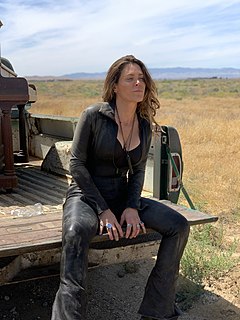
Beth Hart is an American singer, songwriter and musician from Los Angeles, California. She rose to fame with the release of her 1999 single "LA Song " from her second album Screamin' for My Supper. The single was a number one hit in New Zealand, as well as reaching the top 5 of the US Adult Contemporary and Top 10 on the Billboard Adult Top 40 charts.

Joseph Leonard Bonamassa is an American blues rock guitarist, singer and songwriter. He started his career at age 12, when he opened for B.B. King. In the last 13 years Bonamassa has put out 15 solo albums through his independent record label J&R Adventures, of which 11 have reached number 1 on the Billboard Blues charts.
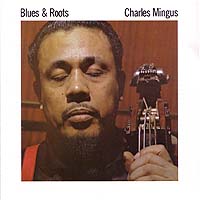
Blues & Roots is an album by American jazz double bassist Charles Mingus, recorded in 1959 and originally released on the Atlantic label in 1960. It has since been reissued on CD by both Atlantic and Rhino.

"Sweet Home Chicago" is a blues standard first recorded by Robert Johnson in 1936. Although he is often credited as the songwriter, several songs have been identified as precedents. The song has become a popular anthem for the city of Chicago despite ambiguity in Johnson's original lyrics. Numerous artists have interpreted the song in a variety of styles.

"Dust My Broom" is a blues song originally recorded as "I Believe I'll Dust My Broom" by American blues artist Robert Johnson in 1936. It is a solo performance in the Delta blues-style with Johnson's vocal accompanied by his acoustic guitar. As with many of his songs, it is based on earlier blues songs, the earliest of which has been identified as "I Believe I'll Make a Change", recorded by the Sparks brothers as "Pinetop and Lindberg" in 1932. Johnson's guitar work features an early use of a boogie rhythm pattern, which is seen as a major innovation, as well as a repeating triplets figure.
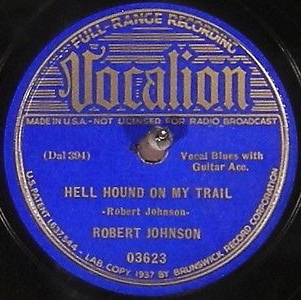
"Hellhound on My Trail" is a blues song recorded by Mississippi Delta bluesman Robert Johnson in 1937. It was inspired by earlier blues songs and blues historian Ted Gioia describes it as one of Johnson's "best known and most admired performances—many would say it is his greatest".
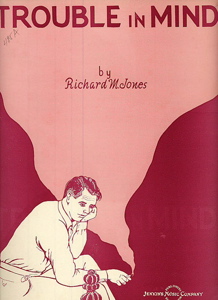
"Trouble in Mind" is a vaudeville blues-style song written by jazz pianist Richard M. Jones. It became an early blues standard, with numerous renditions by a variety of musicians. Although singer Thelma La Vizzo with Jones on piano first recorded the song in 1924, Bertha "Chippie" Hill popularized the song with her 1926 recording with Jones and trumpeter Louis Armstrong.
"Milk Cow Blues" is a blues song written and originally recorded by Kokomo Arnold in September 1934. In 1935 and 1936, he recorded four sequels designated "Milk Cow Blues No. 2" through No. 5. The song made Arnold a star, and was widely adapted by artists in the blues, Western swing and rock idioms.